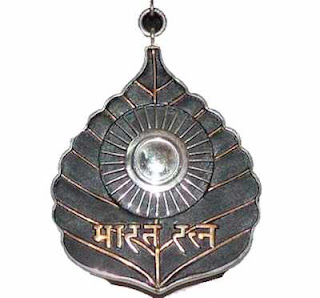Padma Awards
Padma Awards were instituted in the year 1954. The award is given in three categories, namely, Padma Vibhushan, Padma Bhushan and Padma Shri. The awards are announced on the occasion of Republic Day every year and normally not conferred posthumously. However, in highly deserving cases, the Government could consider giving an award posthumously if the demise of the person proposed to be honoured has been recent, say within a period of one year preceding the Republic Day on which it is proposed to announce the award.
The Awards are given in various disciplines/ fields of activities, viz. - art, social work, public affairs, science and engineering, trade and industry, medicine, literature and education, sports, civil service, etc.
- Padma Shri is awarded for ‘distinguished service’.
- Padma Bhushan for ‘distinguished service of a high order’.
- Padma Vibhushan for ‘exceptional and distinguished service'
Bharat Ratna
Bharat Ratna is the highest civilian award of the Republic of India. Instituted in January 1954, the award is conferred "in recognition of exceptional service/performance of the highest order".
- The award was originally limited to achievements in the arts, literature, science and public services but the government expanded the criteria to include "any field of human endeavour" in December 2011.
- Recommendations for the Bharat Ratna are made by the Prime Minister to the President, with a maximum of three nominees being awarded per year.
- Recipients receive a Sanad (certificate) signed by the President and a peepal-leaf–shaped medallion; there is no monetary grant associated with the award.
- Bharat Ratna recipients rank seventh in the Indian order of precedence, but are constitutionally prohibited from using the award name as a title.
- The first recipients of the Bharat Ratna were politician C. Rajagopalachari, scientist C. V. Raman and philosopher Sarvepalli Radhakrishnan, who were honoured in 1954.
- Reciepeients who are alive: - Amartya Sen, Lata Mangeshkar, C. N. R. Rao, Sachin Tendulkar, Atal Bihari Vajpayee.
- The Prime Minister makes the recommendation to the President, who merely signs and endorses the name; the award is conferred.
- Many experts believe that, this is not an appropriate and fair method to select an awardee of such national eminence.
- The Prime Minister’s partisan position lend a bias to such a selection.
- The added scope — “to any field of human endeavour” — make the evaluation very difficult.
- Every modification of the award — from granting it to any and all endeavours, given posthumously, and even open to foreign nationals — has downgraded the merit of award, argues experts.
- Sachin Tendulkar: Many have argued that despite his national and international popularity and obvious greatness he can’t be compared to people whose life has been devoted to public service. Also, in the field of sports the contribution of Dhyan Chand is more and he should be awarded.
- CNR Rao: A PIL was filed against Rao declaring that other Indian scientists, such as Homi Bhabha and Vikram Sarabhai, had contributed more than Rao and his claim of publishing 1400 research papers was "physically impossible". The suit also stated that as Rao had proven cases of plagiarism, he should not be presented with the award but rather should be annulled.
- Madan Mohan Malviya: Bharat Ratna to freedom fighters posthumously has also been criticized by many as there were many freedom fighters with immense contribution towards nation building and selecting an individual is like opening a box of Pandora. Many have also argued that if Mahatman Malviya is being awarded for his contribution towards education (establishment of BHU), then Sir Syed Ahmad Khan equally deserved the award (for establishment of AMU).
- Past Issues: Dr. B.R. Ambedkar was conferred the Bharat Ratna only in 1990 when a government in which his followers had influence was in power while Pandit Nehru and Indira Gandhi were the recipients while they the prime ministers.
Thus a better solution will be to revert to its original intent of commitment to public service, and be open only to Indian nationals. While the award standards should be made more insular, the selection process should require more than just political recommendation.




No comments:
Post a Comment